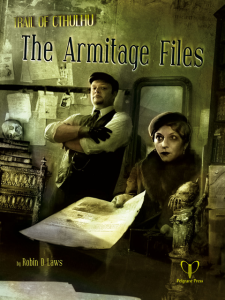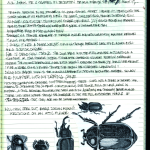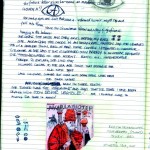Today’s topic is one I’ve been waiting for when I looked over the list of writing prompts. Subject? Favorite game you no longer play.
Let me tell you about The Armitage Files.
 The Armitage Files is a campaign for Trail of Cthulhu, a game about H. P. Lovecraft’s Cthulhu Mythos where investigators go out, save the world, and go insane. I love this game campaign, even though I don’t like Lovecraft’s stories. As a geek in my twenties, I thought I should love the Mythos — it’s something that just seems to speak to gamers — but it never took. I’ve always thought the writings were dull and ponderous as the narrator constantly explains how he will tell you all about this horrific thing that’s just on the next page, like an overwritten The Monster At The End Of This Book. There’s just something about Lovecraft that doesn’t resonate with me. So no, I’m mistaken: I don’t dislike Lovecraft. The feeling I have is indifference.
The Armitage Files is a campaign for Trail of Cthulhu, a game about H. P. Lovecraft’s Cthulhu Mythos where investigators go out, save the world, and go insane. I love this game campaign, even though I don’t like Lovecraft’s stories. As a geek in my twenties, I thought I should love the Mythos — it’s something that just seems to speak to gamers — but it never took. I’ve always thought the writings were dull and ponderous as the narrator constantly explains how he will tell you all about this horrific thing that’s just on the next page, like an overwritten The Monster At The End Of This Book. There’s just something about Lovecraft that doesn’t resonate with me. So no, I’m mistaken: I don’t dislike Lovecraft. The feeling I have is indifference.
Which is why it surprised me when I discovered The Armitage Files and found it utterly amazing.
The campaign is set around the Miskatonic University faculty: Professor Armitage receives two letters that appear to be from himself, in a future after the stars have aligned and the mind-destroying creatures from beyond space and time are let loose to destroy the world. The letters discuss his group’s investigations and how they might have been misled, which culminate in their failure and the unleashing of the horrors. So they come up with a plan: assuming these are actual letters from a future Armitage and his investigations, the Armitage group gathers another batch of investigators to follow up the leads written about in the letters. Perhaps this new group of investigators will make connections that they missed. Perhaps by making different choices, they’ll pull together what the real threat is. Perhaps they’ll stop the coming apocalypse.
The letters (the files of the title) are anywhere from three to five pages, most coming with some sort of extra thing: a burnt photograph, flower petals, bloodstains. In the writings — which become more disturbing as the campaign proceeds onward — there are maybe three, four obvious adventure seeds to follow up. But the letters (and more do arrive) aren’t content to let the investigators go after everything — more arrive, some during investigative cases, prompting the players to decide what is important to follow. Can we investigate the circus before it leaves town? Should we find out why Armitage was interested in the amateaur astronomer club, who are meeting out of town this weeked? A new letter shows up but we haven’t found the travelling salesman mentioned in the last letter! What do we do?

The letters are in sepia and white in the book, but Pelgrane Press has a full color PDF download on their website. ((Under “Forms and Handouts”.)) You can actually hand out the letters as they arrive.
The campaign is driven by the players’ choices. It’s imperative that the players let the GM know what tack they will follow to prep for next time. “There’s an army base mentioned here,” they say. “Let’s investigate that.” And then the next time the players meet, the GM can have something ready. If they don’t go to the Kingsport Yacht Club, they don’t.
And every person mentioned, every place mentioned is in the book, but the details are up to you, the GM, to fill in. The astronomy club in your game might be a cabal of cultists performing sex magic under the stars. In my game, they were just innocent hobbyists, being killed off by a witch. The Kingsport Yacht Club inner circle might be fellow investigators, stalwart and true; they might be fish-things; they might be cannibals. Whatever they are, your game of The Armitage Files and my game will be vastly different.
And this possible future — or is it some unknown alien force toying with the Armitage Group? — starts catching up to the investigators. Our game broke up due to timing and scheduling after a letter arrived, describing the rather gruesome death of one of the players’ investigators. The actual file has a scribbled out section and you’re supposed to point to a player and say “and that’s where your investigator’s name is written,” but thanks to the power of Photoshop, you can easily replace that scribble with the actual character’s name. It was pretty neat, dumping the files on the players, just chatting while they’re skimming over the document, and seeing one of them suddenly come across his character’s demise. “Oh no,” he said, eyes widening. “Oh no!”
Not completing The Armitage Files is going to be my one big gaming regret. It’s such a fantastic campaign concept. Restarting might be a bit difficult because some of us might be going over story beats from earlier, even though everything might be different. Which, I suppose, is exactly how the campaign in The Armitage Files is supposed to function.
Buy The Armitage Files now. ((It’s under “GUMSHOE Print Products” and “GUMSHOE PDFs” at the site.)) It’s the best campaign ever written.
Required reading: Rick Neal’s The Armitage Files actual play reports. Spoilers, but not really because of the nature of the campaign. Start at the bottom of page 3 and work backwards:





